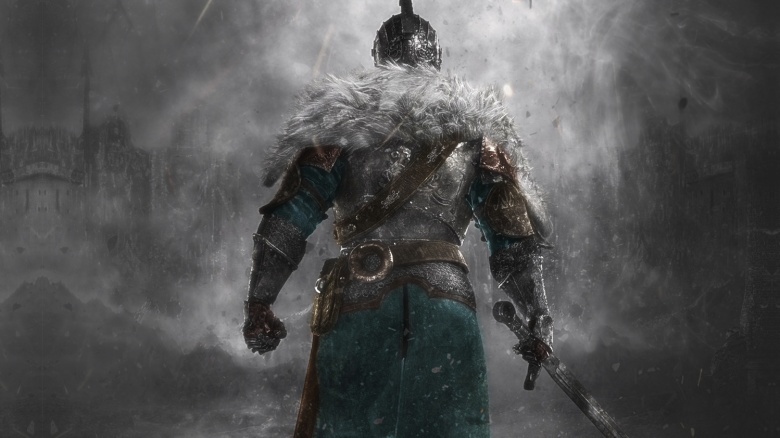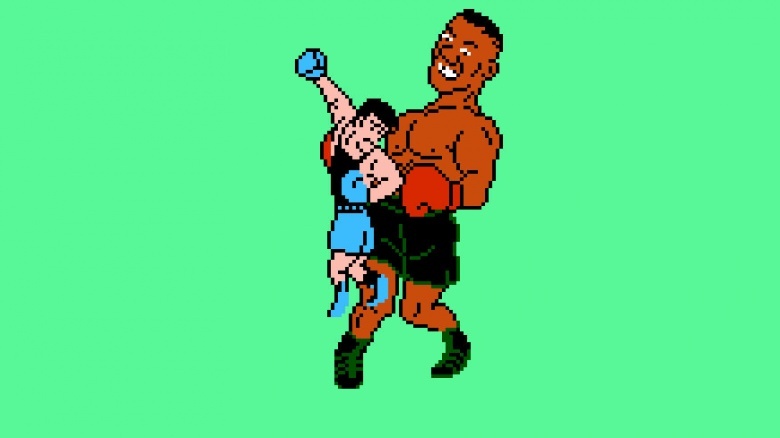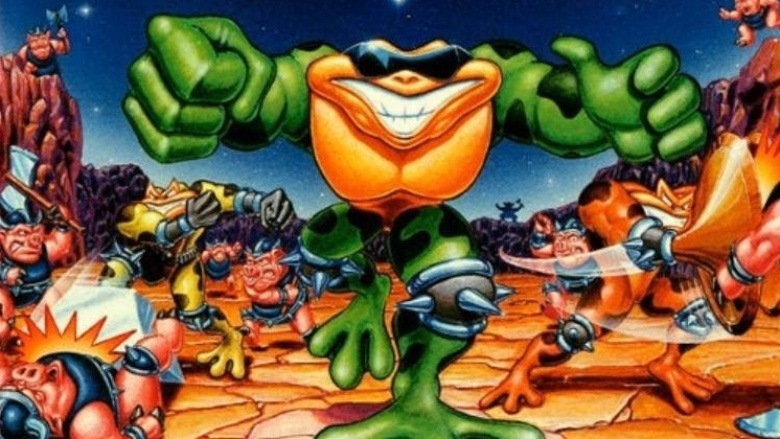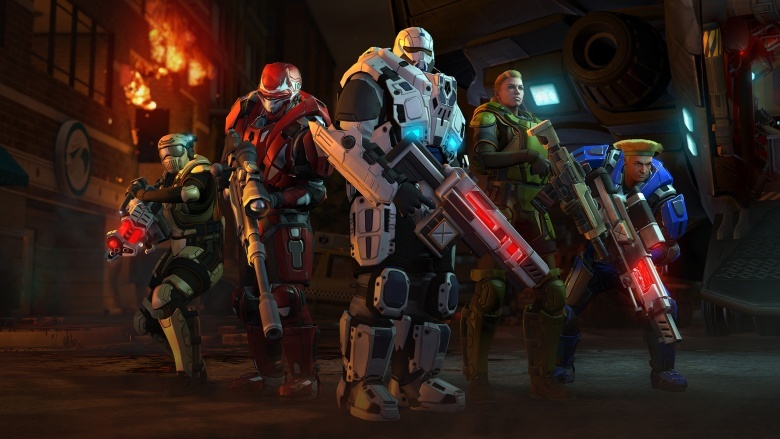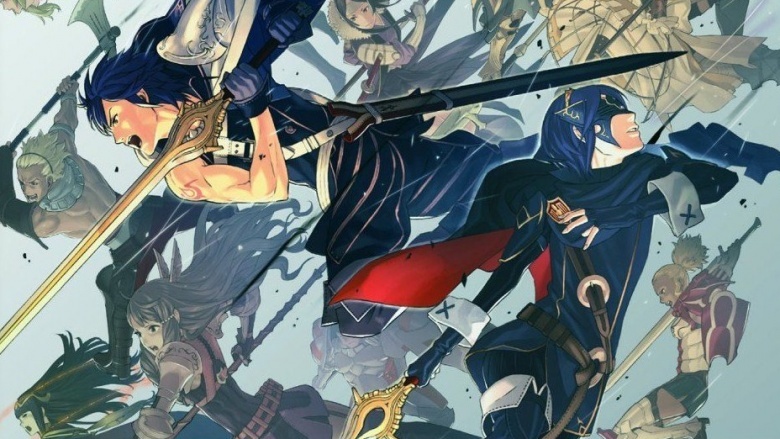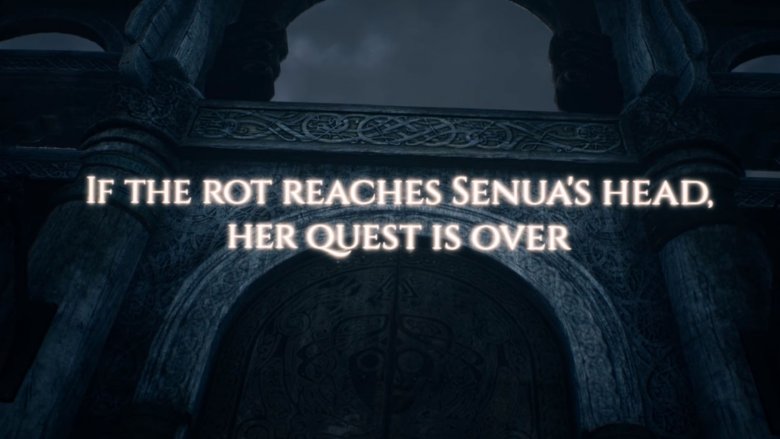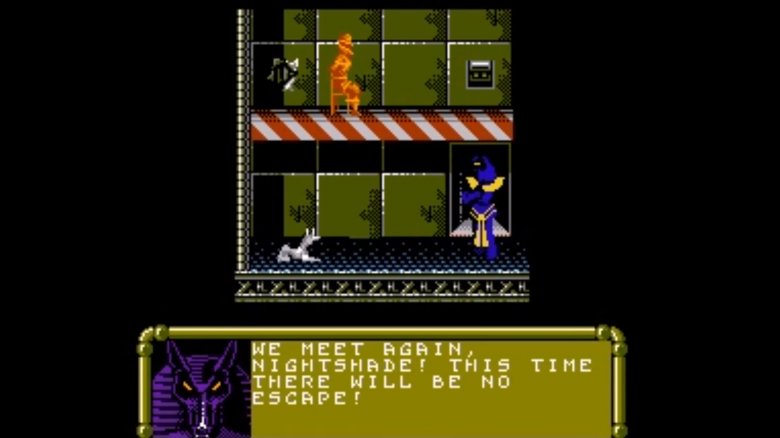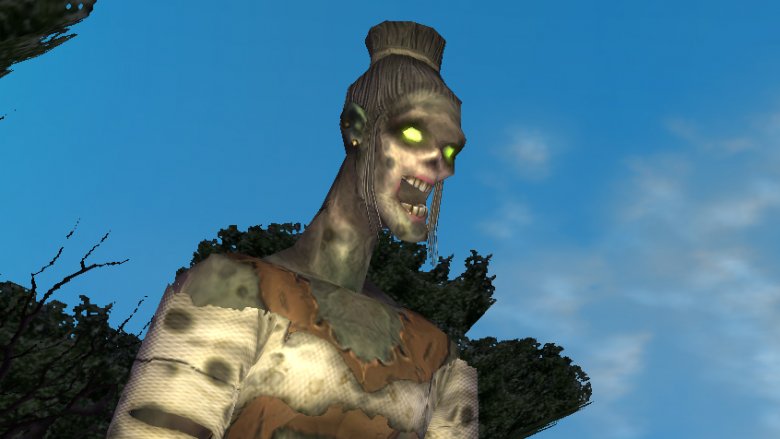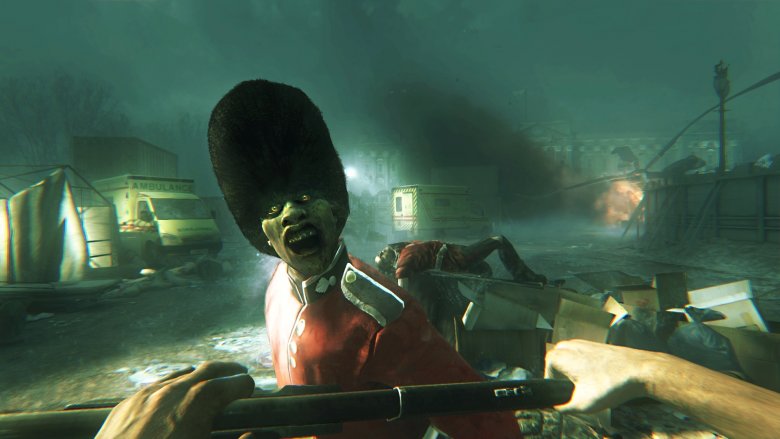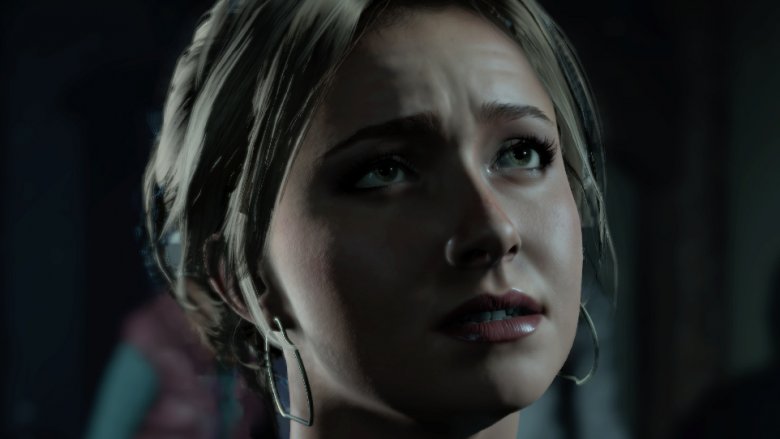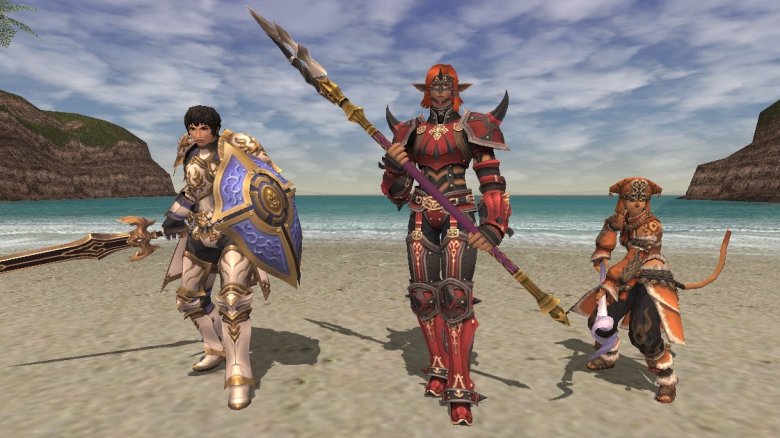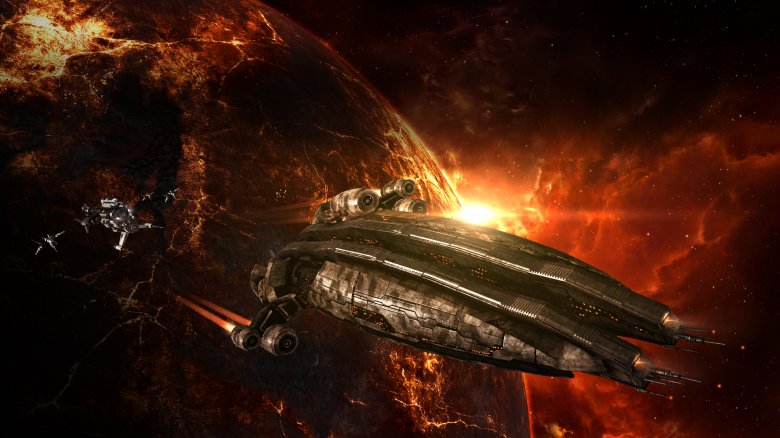Games That Seriously Punish You For Dying
Video games are meant to provide you a challenge, but some are just downright brutal. From the inception of the gaming medium to today, almost every game in some way is about staying alive (uh uh uh uh staying alive, staying alive). Though many games have punished you for failing to keep your life bar filled, few are as mean as the ones that made this list.
All Of The Souls Games
At the core of the Souls games (Demon Souls, Dark Souls, and Bloodborne) is one key reality you must come to accept: death. Again, and again you will perish, in ways that, at times, make it seem like the game is seriously picking on you. It's this challenging cycle that makes RPGs like Demon Souls and Dark Souls so thrilling for many. Exchanging blows with bosses several times your size while narrowly dodging hits that would bring about your untimely demise mean you get to keep (for now) your only form of currency: souls.
Precious, precious souls—they're what allow you to upgrade your armor and weapons, but their very existence makes you question nearly every move. When you die, those souls are dropped. Only upon your reincarnation can they be retrieved—but be wary, if you die on your journey there, those souls are lost forever. There is no Soul Bank. There is only weeping as you lose 20,000 souls to a dragon who burned you to a crisp with little to no warning. Only weeping.
Mike Tyson's Punch Out!! (1987)
All old school gamers know this to be true: beating Mike Tyson in Mike Tyson's Punch Out!! is a badge of honor. Right up there with getting 120 stars in Super Mario 64, scaling the difficult ladder that is Nintendo's seminal NES boxing hit is a masterful achievement.
Think about it—you play a dude no taller than five feet taking on hilariously-named heavyweights like Super Macho Man, Bald Bull, and King Hippo. Even once you beat those guys, you're expected to topple the champion of boxing, Tyson himself, whose only giveaway to the punch he'll throw is the wink of an eye? No wonder there's a secret code on the main menu to skip right to Tyson. Yeesh.
Battletoads (1991)
If you're a gamer of the '80s and '90s, you've likely played your fair share of side-scrolling beat-em-ups: Double Dragon, Golden Axe, and Final Fight to name just a few. Even if you bested all of these games, your skill was most certainly challenged by Battletoads. With brutal enemies and zero checkpoints, Rare's oft-remembered classic is nearly impossible to beat without a friend.
Oh, and you only have three continues when you die. And there's absolutely no save system. Good luck.
XCOM: Enemy Unknown (2012)
Oh, XCOM—how easy it is to love you and so desperately hate you at the same time. If you're unfamiliar with Firaxis Games' slick reboot of the turn-based strategy classic, XCOM, it's a game about building a crack team of skilled soldiers to do battle with Earth-invading aliens. All of whom will die. Good times!
Forget the fact that the game is just genuinely punishing on any mode above Easy (and even then it doesn't always play fair), but whenever a soldier dies in battle, they're gone forever. You may have known Colonel Bootlicker (yes you get to name each one) for only a few minutes, or even days, but when he falls to that sneering Martian across the battlefield, you really feel it. And when Marshall Mallow is sniped running to his aid, controllers get thrown.
It's that sinking feeling in your stomach that returns again and again in XCOM. Don't worry, when all of your good characters die, the game does you a favor and pretty much makes victory an overwhelmingly impossible task. Now you can do it all again!
Fire Emblem Awakening (2012)
If you thought losing people in XCOM was bad, try losing them when they have personalities, relationships, storylines, and roles to play in the course of your game. That's Fire Emblem Awakening in a nutshell. Also a turn-based strategy game like XCOM, Nintendo's hit anime-style title for 3DS exudes difficulty in general combat, but it's even more grueling when it presents you with tough decisions that impact who lives to the end of your tale.
So yeah, real cheery stuff.
Hellblade: Senua's Sacrifice
Sometimes, a threat is all you need. After dying once in Hellblade: Senua's Paradise, the player's warned that, if they keep failing, they'll permanently lose their save file. To show how close the player is to losing all of their progress, the game's hero, Sesuna, starts rotting. With every death, the rot climbs a little higher. In the game's fiction, when the rot reaches Senua's head, she forfeits her soul. In real life, that's when Hellblade will delete the currently active save file, forcing the unlucky and struggling player to start over from the very beginning.
That's the story, anyway. In reality, Hellblade: Senua's Sacrifice isn't quite so cruel. While rot does slowly take over Senua's body as the deaths pile up, players who committed virtual suicide repeatedly report that the decay never actually consumes Hellblade's Pict protagonist. Hellblade's threat is a bluff. Even if you die over and over again, your save file is safe.
It's an effective form of torment regardless. Unless you trawl internet message boards, you'd have no way of knowing that Hellblade is all talk and no action. As a result, watching the disease slowly creep up Senua's body is remarkably tense. Hellblade may not actually pull the trigger, but when you think it's going to, every death feels like a major event. Not only does Hellblade's big lie force you to sympathize with its cursed hero, but it makes the game unbelievably tense—and for many gamers, that extra bit of stress is punishment enough.
Nightshade
Nightshade isn't a regular Nintendo Entertainment System game. Its story, which details the attempts of a lone vigilante who's trying to clean up Metro City after its resident superhero is brutally murdered, is much darker than your typical NES fare. Most of Nightshade is a text-heavy adventure title, more akin to what you'd find on PCs than action-based home consoles. As Nightshade patrols the city streets, he'll be able to help or hurt fellow citizens. That raises (or lowers) his stock as a superhero. Depending on Nightshade's reputation, NPCs will be more or less likely to give players some necessary information.
And then, of course, there's what happens when you die. Technically, Nightshade has five lives, but you're going to have to work in order to use all of them. See, when Nightshade's life bar runs out, the game doesn't restart from a checkpoint. Instead, Nightshade wakes up in a James Bond-style deathtrap. The first time Nightshade fails, he's strapped to a conveyor belt, which slowly propels him towards a crushing machine. Other traps lock him in a room lined with spikes, or leave him at the mercy of a rabid dog. Every trap has its own unique solution, and if you don't figure it out in time, it's an instant game over, no matter how many extra lives you have left.
And, of course, Nightshade's fifth and final deathtrap has no answer. You can't escape. You can try, of course, but the final deathtrap always ends the same way: with Nightshade frozen to death, and a definitive Game Over.
EverQuest
Before World of Warcraft there was EverQuest. Like Blizzard's massively multiplayer juggernaut, EverQuest dropped players into a medieval fantasy world, let them create a colorful and unique character, and sent them out in search of experience points and loot. But unlike in World of Warcraft, EverQuest doesn't treat death like a minor inconvenience–it's a major hassle.
In modern times (yes, almost 20 years later, EverQuest is still running), death isn't too bad—when you bite the big one, you'll respawn with all of your gear, while you can summon your corpse to your current location to recover any lost experience. But in the old days, dying sucked. Originally, when your EverQuest character died, your body stayed where it perished with all of its gear still attached. If you wanted your stuff—and given how hard you worked for it, you probably did—you'd need to fight all the way back to your body completely naked. That meant traversing dangerous territories completely unarmed, ultimately facing down the same monsters that killed you the first time—this time, without any weapons.
As Ultima Online designer Raph Koster explains, the whole idea of so-called "corpse runs" originated in the text-based online role-playing games known as MUDs that had a major influence on EverQuest. But, Koster explains, there's a big difference between a text-based game and a graphical one. On MUDs, a corpse run is a petty chore. In an MMORPG, it can be a multi-hour experience, and a major drag on the game's pace. Ultimately, both EverQuest and the MMORPG industry generally phased out the corpse run concept. In most cases, dying is punishment enough.
ZombiU
Like EverQuest, when you die in ZombiU, you leave behind a body with all of your gear attached. Unlike EverQuest, that body fights back. Oh, sure, if you die due to non-zombie hazards — say, because you caught fire, fell from a tall height, or step on a landmine — the ensuing corpse run should be a piece of cake. You simply need to find your old body and reclaim your loot. No muss, no fuss.
If you succumb to zombie bites, however, things become a little bit harder. In that case, your old body isn't reduced to a simple corpse. It becomes a member of undead horde. If you want your gear, you'll need to track down the fresh zombie and kill it. Depending on how well you played before your demise, that might be difficult. After a high-scoring run, your former body will be surrounded by red smoke, making it extra hard to re-kill. You'll have to move very, very fast, too, because you're not the only one out there zombie hunting. If an online player finds your body before you do, you can kiss your hard-earned loot goodbye.
Until Dawn
In most story-based games, when the player fails, that's the end. The narrative can't continue without its main characters, and so the game resets and the player gets to try again. The interactive slasher flick Until Dawn isn't nearly as forgiving. When one of Until Dawn's teenage cast members dies, the game keeps on going. You just won't see the victim any more, thanks to them being, well, dead.
So don't get too attached to Nashville star Hayden Panettiere's Sam, Mr. Robot lead Rami Malek's Josh, or Mike, played by Agents of S.H.I.E.L.D.'s Brett Dalton. There's a good chance that none of them will make it to Until Dawn's blood-soaked conclusion. Don't bank on being able to load an old save in order to keep them alive, either. Until Dawn autosaves after every major decision and setpiece. The only way to revive a deceased character is to start the game over from the very beginning.
Creative director Will Byles claims that developer Supermassive made that decision in order to ramp up the tension, and not just to be "not just to be mean or petty." But we're not convinced. After all, going through the entire ten-plus hour adventure without your favorite character is a pretty sever punishment for making one bad decision.
Kid Icarus Uprising
Many games let players choose a difficulty level, but in Kid Icarus: Uprising, if you want to play a harder game, you're going to have to work for it. At the beginning of every level of Uprising, players can pour hearts into the Fiend's Cauldron, raising or lowering the stage's intensity rating on a scale from zero to nine. At higher intensity levels, you'll encounter stronger enemies—and a lot more of them—but you'll also earn more hearts and better weapons.
When you die, however, Kid Icarus: Uprising drops the intensity by a full point. At higher intensity levels, that'll cost you thousands of hearts. Not only does the lower intensity make it harder to earn hearts—you know, the same items that you need to raise the intensity to begin with—but you'll also miss out on sweet loot. Special doors called Intensity Gates, which guard special treasures, can only be opened at higher intensity levels, and if the game isn't hard enough when you encounter them, you won't be able to get inside. When you perish, Kid Icarus even shows you every single heart you've lost on the death screen. You know, just to really rub it in.
Lose/Lose
Lose/Lose–billed as an art project dedicated to "exploring what it means to kill in a video-game"–is much more than it seems. On the surface, it's a fairly standard shooter in the same vein as Space Invaders and Galaga. Dig a little deeper, however, and you'll find that Lose/Lose is much, much more insidious. Not only can a round of Lose/Lose wreak havoc on your computer, but once you die, you can't play any more. Literally. When the player's ship explodes, the game deletes itself, ending the game permanently.
Maybe that's for the best. See, in Lose/Lose, the alien ships that scroll down the screen aren't just random enemies. Each one represents a unique file on the player's computer, and killing the incoming spacecraft deletes the file for good. All those old vacation photos or college term papers or folders full of MP3s—or, more crucially, the system files that your computer needs to run? They're all fair game. As a result, not only does the player's death carry a big, big penalty, but enemy deaths do, too, and block the game from running entirely, although that hasn't stopped some masochists from going for the top score anyway.
While some virus scanners classify Lose/Lose as a Trojan horse, the game is still available if you're brave enough to try it out. Just remember: the only real way to win Lose/Lose is not to play at all.
Final Fantasy XI
Final Fantasy XI is famous for two reasons: not only did the game transform Square Enix's flagship franchise from a single-player game to a massively multiplayer online experience, but it's also hard. Very, very hard. Unlike its sequel, Final Fantasy XIV, you won't be able to explore Final Fantasy XI's world solo. You either team up with others or you're going to die. It's that simple.
And you want to die as little as possible while playing Final Fantasy XI, because every time your character bites it, you lose some valuable experience points. As a result, when you die in Final Fantasy XI, you can actually go backwards in terms of levels. At launch, Final Fantasy XI's death penalties were particularly harsh, and while they've softened over time, you'll still lose some hard-earned progress after each and every demise.
Losing levels isn't just a waste of time, either. If you don't plan ahead, you can end up absolutely screwed. See, in Final Fantasy XI, you boost your stats by wearing better gear. The type of gear that you can equip is directly tied to your character's level. If you lose a level or two, you might not be able to use your stuff, and if you don't have lower-level back-ups lying around, that'll leave you virtually naked. Best of luck getting back to a reasonable level without the aid of armor or weapons. If you've played Final Fantasy XI before, you know that you're going to need it.
Wasteland
If you're one of the millions and millions of players who love Fallout, you owe a big debt to Wasteland. Released back in 1988, a full nine years before Interplay created its unofficial sequel, Wasteland is a fully-featured open-world RPG set in a burned out post-nuclear wilderness. As you explore, unraveling mysteries and battling irradiated foes, you'll also recruit a number of characters to your party. But be careful: if they die, they're gone for good.
See, like Fallout 4 and some other open-ended RPGs, Wasteland takes place in a persistent open world. In other words, when Wasteland's setting changes, it stays that way—in this case, literally. Computers in 1988 didn't necessarily come with hard drives, and so in order to preserve players' in-game actions, Wasteland rewrote the game data on the floppy disks that powered the game while you played.
On the plus side, that means that players' actions really do have lasting consequences. On the negative, unless you make a copy of the game disks before you start playing (something that Wasteland's developers actually recommended), you can never start over. The idea that everything that you do is permanent is thrilling—right up until you make a mistake. Then, as you look over your virtual friends' digital corpse (or, at the very least, read about it in the game's mandatory manual), the real horror sets in.
EVE Online
EVE Online's player-driven economy is so complicated that CCP, the company that makes the game, hired a professional economist to keep things straight. Still, on a basic level, here's what you need to know. Players can earn Interstellar Kredits, or ISK, by playing EVE. They can also purchase Pilot's Licence Extensions, more commonly known as PLEX, with either ISK or real-world cash. Once you have PLEX, you can do two things with it: you can redeem it to help pay for subscriptions or microtransactions, or you can sell it to other players.
It's confusing, but the end result is that EVE Online's in-game currencies have, for all intents and purposes, real-world value. And what does that have to do with death, you ask? Well, you buy your EVE Online ships with ISK. As a result, when they blow up, you can actually quantify the destruction using real-life money.
That's why you'll occasionally see headlines saying that EVE Online battles cost players hundreds of thousands of dollars. No, players didn't actually pour that much cash directly into the game—most people probably earned the ISK they used to buy the ships from gameplay. Still, that doesn't take off the hurt for players who lost property. Maybe they didn't actually spend $1,600 on a virtual spaceship, but knowing that you lost an item as valuable as a mid-range laptop? That's gotta sting.

